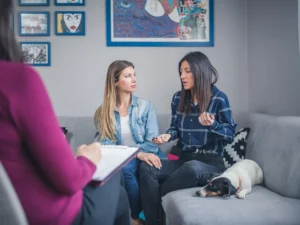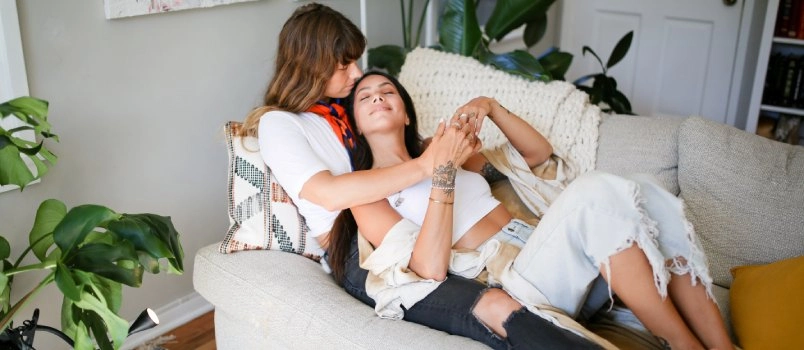In today’s diverse society, love comes in many forms and orientations. Lesbian relationships, like any other, thrive on trust, communication, and mutual understanding. However, navigating the intricacies of a lesbian relationship can sometimes present unique challenges. This blog post offers valuable lesbian relationship advice to help couples foster love, build strong connections, and overcome hurdles together.
Contents
How Does Lesbian Relationship Advice Work?
 A lesbian relationship, like any other romantic relationship, is built on love, respect, and mutual understanding between two women. The dynamics of a lesbian relationship can vary greatly depending on the individuals involved, their personalities, and their unique experiences.
A lesbian relationship, like any other romantic relationship, is built on love, respect, and mutual understanding between two women. The dynamics of a lesbian relationship can vary greatly depending on the individuals involved, their personalities, and their unique experiences.
However, there are some common aspects that contribute to the functioning of a lesbian relationship:
- Shared Values and Interests: A strong relationship often thrives when partners have shared values, interests, or goals. Having common ground allows for meaningful conversations, shared activities, and a sense of companionship. However, it is also important to respect and appreciate each other’s individuality and personal interests.
- Mutual Respect and Equality: In a healthy lesbian relationship, both partners treat each other with respect and equality. This means acknowledging each other’s opinions, needs, and boundaries. Decision-making and responsibilities are shared, and power dynamics are balanced. Respecting each other’s autonomy is crucial for a harmonious relationship.
- Intimacy and Romance: Physical and emotional intimacy plays an important role in a lesbian relationship. This can include expressions of affection, sexual intimacy, cuddling, kissing, and other forms of physical connection that are mutually desired and consented to by both partners.
- Support and Empowerment: Lesbian partners often provide support and empowerment to each other. They celebrate each other’s achievements, offer a shoulder to lean on during difficult times and encourage personal growth. Being there for each other emotionally, mentally, and physically strengthens the bond and helps overcome challenges together.
- Family and Social Integration: Lesbian relationships can involve navigating societal attitudes and family dynamics. Partners may choose to come out to their families and seek acceptance and support. Building a network of friends, allies, and LGBTQ+ community connections can provide additional support and understanding.
Understanding Communication In Lesbian Relationships
 Communication is a vital aspect of any relationship, including lesbian relationships advice. Effective communication allows partners to understand each other, express their needs and desires, resolve conflicts, and build a strong connection.
Communication is a vital aspect of any relationship, including lesbian relationships advice. Effective communication allows partners to understand each other, express their needs and desires, resolve conflicts, and build a strong connection.
Here are some key points to consider when understanding communication in lesbian relationships:
- Open and Honest Communication: Lesbian partners should strive for open and honest communication. This involves being truthful about feelings, thoughts, and concerns. By creating a safe and non-judgmental environment, partners can encourage each other to share openly.
- Active Listening: Listening attentively is crucial for effective communication. Partners should practice active listening, which involves giving their full attention, maintaining eye contact, and avoiding distractions. This helps to understand the speaker’s message and demonstrates respect.
- Non-Verbal Communication: Non-verbal cues, such as body language, facial expressions, and touch, play a significant role in communication. Partners should be attuned to these cues to understand each other’s emotions and needs. This can foster deeper connection and empathy.
- Conflict Resolution: Disagreements and conflicts are a natural part of any relationship. Lesbian partners should approach conflicts with patience, empathy, and a willingness to find solutions. Using “I” statements to express personal feelings and needs can help avoid blame or defensiveness.
- Boundaries and Consent: Clear communication around boundaries and consent is vital in lesbian relationships, as in any relationship. Partners should openly discuss their boundaries, desires, and limits, and respect each other’s boundaries at all times. This helps maintain trust and foster a healthy dynamic.
- Relationship Goals: Discussing relationship goals and expectations is essential. Partners should have ongoing conversations about their visions for the future, commitment levels, and any concerns or aspirations they may have. Aligning these goals can contribute to a stronger, more fulfilling relationship.
How To Improve Closeness In Lesbian Relationships?
Improving closeness in a lesbian relationship involves nurturing emotional connection, fostering intimacy, and creating a sense of deep bond and understanding. Here are some suggestions to enhance closeness in a lesbian relationship:
Quality Time
Quality time refers to dedicated moments spent together, focusing on each other and building a meaningful connection. It involves engaging in activities that both partners enjoy, having deep conversations, and creating shared memories. Quality time helps strengthen the emotional bond, deepen understanding, and nurture closeness in a lesbian relationship.
Emotive Vulnerability
 Emotive vulnerability refers to the willingness and ability to express one’s emotions openly and honestly in a relationship. It involves being authentic and allowing oneself to be emotionally exposed, sharing fears, insecurities, and desires. Emotive vulnerability fosters a deep level of emotional intimacy, trust, and understanding between partners in a lesbian relationship.
Emotive vulnerability refers to the willingness and ability to express one’s emotions openly and honestly in a relationship. It involves being authentic and allowing oneself to be emotionally exposed, sharing fears, insecurities, and desires. Emotive vulnerability fosters a deep level of emotional intimacy, trust, and understanding between partners in a lesbian relationship.
Physical Affection
Physical affection refers to the use of touch and physical gestures to express love, care, and attraction in a relationship. It includes acts such as holding hands, hugging, kissing, cuddling, and gentle caresses. Physical affection plays a vital role in building closeness, creating a sense of connection, and enhancing the emotional bond between partners in a lesbian relationship.
Supportive Environment
Create a supportive environment where both partners feel safe to be themselves. Show unconditional support for each other’s goals, dreams, and personal development. Celebrate each other’s achievements and offer a shoulder to lean on during challenging times. This fosters a strong sense of closeness and trust.
Surprise Gestures
Surprise gestures are unexpected acts of kindness or thoughtfulness that one partner does for the other in a relationship. They can range from small gestures like leaving a sweet note or preparing a favorite meal to bigger surprises like planning a spontaneous outing or arranging a surprise gift. These gestures show love, appreciation, and effort, enhancing the bond and adding excitement to a lesbian relationship.
Shared rituals and traditions are special activities or customs that partners in a relationship create and engage in together. These can be regular practices such as a weekly movie night, cooking together, or celebrating anniversaries in a specific way. Shared rituals and traditions foster a sense of unity, create lasting memories, and strengthen the bond between partners in a lesbian relationship.
Remember, building closeness in a lesbian relationship requires ongoing effort and commitment from both partners.
Limitations To Consider In Lesbian Relationships
 Lesbian relationships can be fulfilling and rewarding, it’s important to be aware of certain limitations that can arise.
Lesbian relationships can be fulfilling and rewarding, it’s important to be aware of certain limitations that can arise.
These limitations include:
- External Challenges: Lesbian couples may face external challenges such as societal prejudice, discrimination, or lack of acceptance from family, friends, or communities. These external factors can add stress and strain to the relationship.
- Internalized Homophobia: Internalized homophobia refers to negative feelings or beliefs about one’s own sexual orientation, which can affect self-esteem and contribute to relationship difficulties. It’s crucial to address and work through any internalized homophobia to promote a healthy relationship.
- Limited Representation and Role Models: The lack of representation and visible role models in society can make it challenging for lesbian couples to find guidance or examples of successful relationships. Seeking support from LGBTQ+ communities, counseling, or online resources can help mitigate this limitation.
- Intersectionality and Identity Differences: Lesbian relationships, like any other, can involve differences in race, ethnicity, socioeconomic status, religion, or cultural background. These intersecting identities may bring unique challenges and require understanding, respect, and open dialogue to navigate effectively.
- Relationship Dynamics: Lesbian relationships, like all relationships, can experience challenges related to power dynamics, expectations, and differing relationship goals. Open and honest communication, negotiation, and mutual understanding are essential in addressing and navigating these dynamics effectively.
Remember, being aware of these limitations allows for proactive steps to address and overcome them. By fostering open communication, seeking support, and working together, lesbian partners can build a strong and resilient relationships.
Conclusion
In conclusion, building a successful and fulfilling lesbian relationship requires open communication, emotional connection, and mutual respect, and thus, lesbian relationship advice matters. It is essential to prioritize quality time, emotional vulnerability, physical affection, and surprise gestures to nurture closeness. Recognizing and addressing the limitations such as external challenges, communication barriers, and internalized homophobia can help navigate potential obstacles. By fostering a supportive and inclusive environment, embracing individual differences, and seeking support when needed, lesbian couples can cultivate a strong, loving, and resilient partnership.
Relationships are complex, and it’s natural for issues to arise along the way. If you have any queries regarding Relationship Counseling experienced therapists at CoupleMantra can help: Book a trial couple therapy session.


